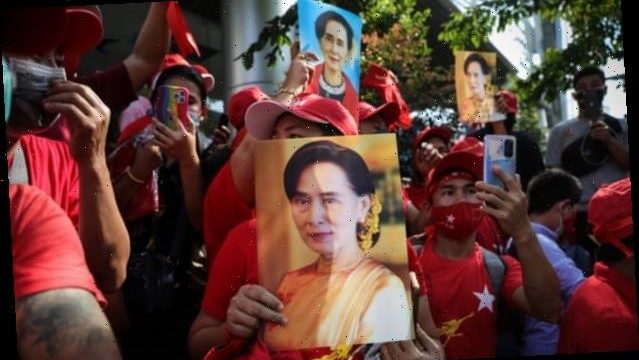Western companies are facing growing calls to break ties with businesses run by Myanmar’s military after last week’s coup threatened to cast the impoverished south-east Asian country back into full-blown dictatorship.
The Japanese drinks company Kirin Holdings has announced it will abandon its involvement with a Myanmar brewery after a six-year partnership because of its close links to the military.
Many western firms rushed back into the country to seize commercial opportunities presented by the opening up of a country of 55 million people after the return of democracy.
‘We’re not brainwashed’: a week of turmoil in Myanmar
But as the generals try to turn the screw on opposition, activists are criticising oil and gas companies that have set up highly profitable joint ventures with the Myanmar’s military chiefs to exploit mineral resources.
French oil and gas company Total owns 31.24% of the Yadana offshore gas field while the US company Chevron owns 28% through a subsidiary. The rest is shared with a Thai company and the state-owned Myanmar Oil and Gas Enterprise (MOGE). The latter has an opaque structure, does not publish accounts and does not have a website, leading to accusations that revenues may not reach the public coffers and could instead be controlled by corrupt officials and the military.
The National Resource Governance Institute, a not-for-profit organisation based in New York that monitors how nations use their mineral wealth, said that in 2013-14 only 880m Myanmar kyat ($600,000) of MOGE’s revenues were transferred to the ministry of finance out of a total of 1.3tn ($926bn). The rest was placed in “other accounts” where the funds are kept off-budget and beyond scrutiny.
Total reported that it handed over €229.6m ($257m) to the Myanmar authorities in 2019, making it one of the biggest sources of revenue for a government wholly controlled as of last week by the military.
“We call on all oil and gas companies to end their relationship with Myanmar Oil and Gas Enterprise and exit our country,” said Yadanar Maung, a spokesperson for Justice For Myanmar.
‘We all know what we’re facing’: divided Myanmar unites against coup
“Every day they stay in production they are earning much needed revenue for the military regime, fuelling brutal repression. We call on Total, Chevron and all other oil and gas companies to act now and stand with the people of Myanmar. If they continue business as usual we will hold you responsible for the brutality that the military inflicts on the people.”
Total was not available for comment but its website says that since expanding into Myanmar in 1992 it has set up a “far-reaching corporate social responsibility program” targeting education, public health, job creation, micro-finance and access to energy.
A Chevron spokesperson said it conducted its business in a “responsible manner, respecting the law and universal human rights to benefit the communities where we work. We support the people of Myanmar on their journey to a modern, peaceful, and prosperous nation. We are monitoring the situation closely and hope for a peaceful resolution through dialogue.”
Many foreign companies, including leading British companies such as Unilever and Prudential, operate in Myanmar without doing business with the military.
But the issue is a complex one, Australia’s former ambassador to the country said, and the urge to condemn some businesses should not obscure the fact that many had done trying to build human rights since the return of democracy.
Christopher Lamb, who chairs the Australian Myanmar Institute, said it was “easy to take on a mining company but we have to look beyond that”.
“It’s sometimes difficult to measure what they’re doing, but companies have contributed to opening up and transparency. They have helped to bring Myanmar into the fabric of international business,” he said.
The military’s seizure of power on 1 February, along with the detention of the democratically elected leader Aung San Suu Kyi and Win Myint from her National League for Democracy party, has provoked a furious backlash on the streets of Myanmar.
Three-finger salute: Hunger Games symbol adopted by Myanmar protesters
After three days of public protests, organised despite an internet blackout imposed on the country, the military responded with a curfew but demonstrators took to the streets again on Tuesday in defiance of the ban.
Pro-democracy activists have called for the outside world to put pressure on the generals and the US president, Joe Biden, has threatened to resume sanctions following the military coup.
The pressure has already been enough for Kirin to withdraw from the troubled country, whose treatment of its minority Muslim Rohingya people was declared genocide by the UN in 2018.
Kirin, the multinational owner of beer brands such as Kirin and XXXX, was one of the first global companies into the once-hermetic state after the first free elections in a generation in 2015, taking a controlling stake in both Myanmar Brewery and Mandalay Brewery in partnership with Myanma Economic Holdings Ltd (MEHL). Bernstein Research valued Kirin’s stake in the joint ventures at between US$1.4bn and US$1.7bn.
But it was always a difficult marriage: MEHL is controlled by the country’s repressive military and a UN investigation has found the company is overseen by the coup leader, senior general Min Aung Hlaing.
Min Aung Hlaing was the commander-in-chief of the Myanmar military when it waged its 2017 campaign against the Rohingya. He has been individually sanctioned by both the US and UK.
In a statement Kirin said: “Given the current circumstances we have no option but to terminate our current joint-venture partnership with Myanma Economic Holdings Public Company Limited, which provides the service of welfare fund management for the military.”
The Amnesty International Australia campaigner Tim O’Connor said: “It’s only a shame it took a military coup d’etat for them to finally move on what was always a venture that delivered huge sums of money to Myanmar military and their leaders who are accused of the gravest human rights violations.”
Source: Read Full Article
